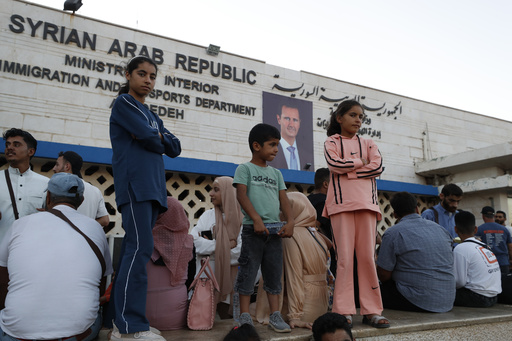
BEIRUT — A significant number of Syrian refugees have made their way back to Syria since Israel initiated extensive airstrikes across Lebanon in September. Many of these individuals, who originally sought refuge in Lebanon after the onset of the Syrian war in 2011, are hesitant to return.
However, for Lebanese officials, the return of these refugees is viewed as a potential positive outcome amidst the ongoing conflict between Israel and Hezbollah, which has taken more than 3,000 lives and displaced approximately 1.2 million individuals within Lebanon. Some Syrian nationals are optimistic that the repatriation could lead to increased international aid and an easing of Western sanctions impacting their homeland.
Nisreen al-Abed, who returned to her hometown in northwest Syria in October after spending 12 years in Lebanon’s Bekaa Valley, expressed her fears regarding the situation her family faced. Although the air bombardments were alarming, her primary concern was the health needs of her 8-year-old twin daughters, who require regular blood transfusions to manage thalassemia, a rare blood disorder. “I was concerned that I wouldn’t be able to secure blood for them in Lebanon under these circumstances,” she stated.
During their arduous journey, Al-Abed and her daughters navigated through both government and opposition-held territories before finally reaching her parents’ home, while her husband stayed behind in Lebanon. Reflecting on the sequence of events, she mentioned, “Before this situation arose, I had no thoughts of returning to Syria.” According to data from the U.N. refugee agency, over 470,000 individuals—predominantly Syrian refugees—have crossed back into Syria since escalating tensions in Lebanon began. Meanwhile, Lebanon’s General Security agency estimates that over 550,000 people have crossed the border, with a vast majority being Syrian.
Most individuals returning home are settling in government-controlled regions of Syria, as reported by UNHCR, while others are heading to Kurdish-ruled areas in the northeast and smaller groups to the opposition-held northwest. Political figures in Lebanon, who previously hosted around 1.5 million Syrian refugees, have long advocated for these individuals to return to their homeland, even as some remain resistant to their reentry.
Lebanon’s caretaker Minister of Social Affairs, Hector Hajjar, mentioned in an interview that the conflict in Lebanon might offer “a favorable circumstance, providing an opportunity for a significant number of displaced Syrians to return home, given that conditions are reportedly better there.”
As the Syrian government grapples with the economic implications stemming from the influx of returnees, authorities in Damascus view the situation as a rationale for advocating the easing of Western sanctions imposed on President Bashar Assad’s administration. The nation was already dealing with significant economic challenges, and the sudden wave of returnees has further exacerbated inflation and scarcity of goods, intensified by Israeli airstrikes affecting cross-border trading routes.
Analysts like Abdul-Qader Azzouz have noted the adverse economic conditions and underscored that the increased refugee presence only compounds the existing strain on resources. Alaa al-Sheikh, an official from Damascus, has called upon the U.S. to lift sanctions, citing the overwhelming influx and consequent needs for international support.
However, the safety of returning refugees raises alarms among rights organizations. An estimate from the Jordan-based think tank ETANA indicates that around 130 individuals faced “arbitrary arrests” at various border crossings within Syria, despite the government announcing an amnesty for draft evaders. Joseph Daher, a Swiss-Syrian researcher, remarked on the limited scale of these arrests, suggesting the Assad regime is less likely to perceive the returnees as a threat due to their demographics—predominantly women and children.
Daher expressed skepticism regarding government narratives portraying a welcoming attitude toward returnees, labeling such accounts as propagandistic. He articulated that the regime lacks readiness both economically and politically to accommodate the returnees effectively.
In recent statements, UNHCR chief Filippo Grandi mentioned that negotiations with the Syrian government are ongoing to ensure the safety of all returning individuals. He also appealed for donor support to provide humanitarian aid necessary for Syria’s recovery post-conflict.
The UNHCR has indicated that typically, individuals departing the country where they are registered as refugees may lose their protected status. Rula Amin, a spokesperson for UNHCR, noted the current context of synchronized departures under duress complicates the situation, suggesting it will be handled with necessary empathy and safeguards.
Former UNHCR official Jeff Crisp believes that Syrian refugees deserve continued international protection due to the profound risks they face in both countries. Notably, some refugees have utilized smuggler routes to evade detection, such as one individual known by the honorific “Mother of Yaman,” who sought refuge in Raqqa after leaving the heavily bombarded areas of Beirut. She explained her decision to bypass official channels as a precaution, in case they needed to return to Lebanon later.
Looking to the future, she contemplated the possibilities of returning should the violence in Lebanon subside, emphasizing the uncertainty of the situation.
